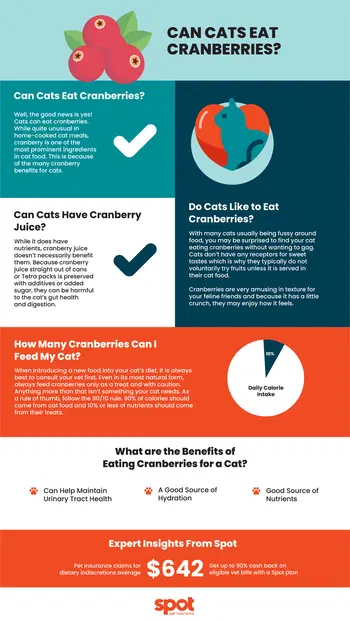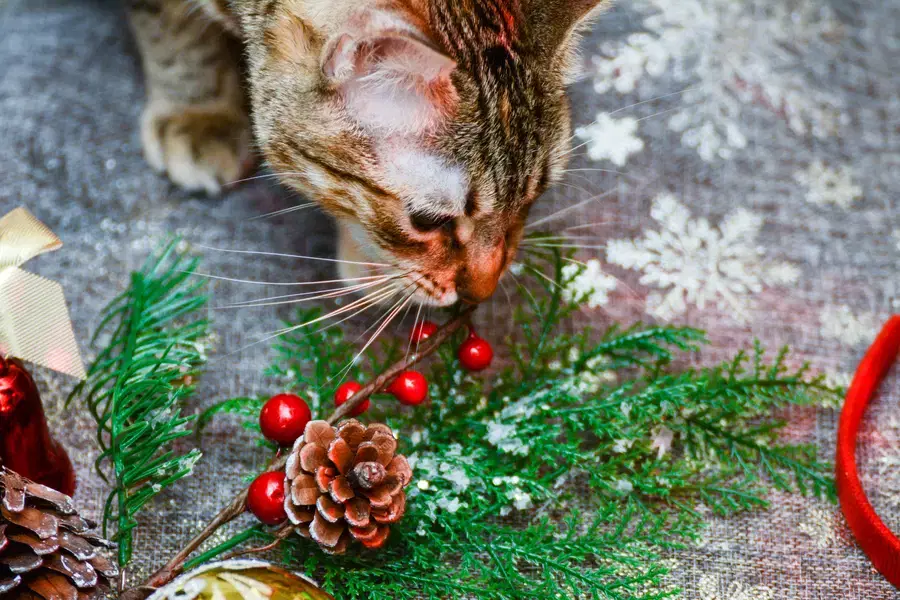With winter just around the corner, you already know it’s the holiday season. Between the Christmas lights to New Year’s Eve, we all have our calendars filled up with dinners, lunches, and places you need to be at. And with holiday dinners comes some love baked into cranberry cakes and chocolate muffins. And we don’t see our pet cat any different than family, do we? In that case, it’s only human to want to share your baked goodness with your cats. But can your cat eat every ingredient that goes into our treats?

Can Cats Eat Cranberries?
Well, the good news is yes! Cats can eat cranberries. While quite unusual in home-cooked cat meals, cranberry is one of the most prominent ingredients in cat food. To put it in perspective, according to research, about 16% of wet cat food contains cranberries.1 This is because of the many cranberry benefits for cats. Looking to feed cranberry to your cat? Here’s everything you need to know.
Also, here are a few other berries your cat might enjoy!
Do Cats Like to Eat Cranberries?
With many cats usually being fussy around food, you may be surprised to find your cat eating cranberries without wanting to gag. Cats don’t have any receptors for sweet tastes which is why they typically do not voluntarily try fruits unless it is served in their cat food.
Cranberries are very amusing in texture for your feline friends and because it has a little crunch, they may enjoy how it feels. If your cat doesn’t feel like nibbling on them, it’s best to not force-feed it. Because cats are obligatory carnivores there is very little source of nutrients from cranberry that your cat will need.
What are the Benefits of Eating Cranberries for a Cat?
As human food, cranberries are packed with many health benefits for us, but is that the same for your cats? Let's find out.
Can Help Maintain Urinary Tract Health
While there is some more research needed, there are studies that suggest cranberries can help prevent urinary tract infections in cats. While it doesn’t treat UTIs, they could help protect them from getting one. The proanthocyanins present in cranberries help prevent bacteria from sticking to the urinary tract walls.1
However, it's important to note that studies in humans have shown variable results and the effects of cranberries may differ in species and type of bacteria.2
A Good Source of Hydration
Unlike most pets, cats do not get an urge to hydrate very often. This can make them more prone to becoming dehydrated. While wild cats typically get their hydration from what they eat, it's the indoor cats that need water at regular intervals. Because cranberries are typically 90% water, this can be a good hydrating treat for your furry friends.1
Good Source of Nutrients
Packed with loads of vitamins, minerals, and nutrients, cranberries can be extremely healthy for your cat. Cranberries contain Vitamin A, C, magnesium, copper, and iron as well. All these nutrients also make up a significant amount of their cat food.1 This is why a few cranberries can make great little treats for your cats.
How Many Cranberries Can I Feed My Cat?
When introducing a new food into your cat’s diet, it is always best to consult your vet first. While cats can eat cranberries, it all depends on the quantity.
Once you get a nod from your vet, take it slow. Feed them only a couple of cranberries and watch how they react to it. Because cranberry is a fruit, you can feed them raw to your cat. However, dried or cooked cranberries are also okay if they are in their natural form. Avoid canned cranberry or cranberry sauces as they usually contain preservatives and high levels of sugar. Both can create discomfort for your cat’s tummy.
Even in its most natural form, always feed cranberries only as a treat and with caution. Anything more than that isn’t something your cat needs. As a rule of thumb, follow the 90/10 rule. 90% of calories should come from cat food and 10% or less of nutrients should come from their treats.1
Can Cats Have Cranberry Juice?
While it does have nutrients, cranberry juice doesn’t necessarily benefit them. Because cranberry juice straight out of cans or Tetra packs is preserved with additives or added sugar, they can be harmful to the cat’s gut health and digestion.
Expert Insights From Spot
While sharing our favorite foods with our pets can be tempting, it's important to remember that not all human foods are safe for cats. Spot's internal data shows that pet insurance claims for dietary indiscretions average $642*, highlighting the importance of caution and research before sharing snacks with your pet.
How Spot Pet Insurance Can Help
Spot’s Accident-Only and Accident and Illness plans can help with the eligible costs of treatment if your cat is experiencing stomach issues after eating something they shouldn't have. Spot's cat insurance plans can provide up to 90% cash back on eligible vet bills, so you can choose the best treatment for your pet with less worry about the cost. Get a free quote today!
Conclusion:
With so many benefits of cranberries for cats, it is obvious that you can serve them as occasional treats for your furry friends. While cats can eat cranberries, is always important to feed them in moderation. Cranberry can be helpful for maintaining the good urinary tract health of a cat but always consult your vet before relying on it. As a rule of thumb, do not replace the cat food with cranberries or serve them store-bought cranberries that can be harmful to their gut health. Because cats are obligatory carnivores, there is very little benefit a cat can get from fruits or vegetables. This is why, even if you do serve your cats some cranberries, you should only rely on animal-based proteins for their dietary needs.

With 15 years as a dog and cat parent, my pet articles are a mix of humor and firsthand experience - proof that the best stories often come with paws and purrs.
*Jan 2019 to Aug 2024 Spot Pet Insurance Services, LLC claims data.
Sawatzky, Jasmine. "Can Cats Eat Cranberries?" Wag Walking, 28 Oct. 2022, https://wagwalking.com/wellness/can-cats-eat-cranberries.
Adams, Christian. "Can Cats Eat Cranberries?" Catster, 19 Jun. 2025, https://www.catster.com/nutrition/can-cats-eat-cranberries/.
The information presented in this article is for educational and informational purposes only and does not constitute or substitute for the advice of your veterinarian.











